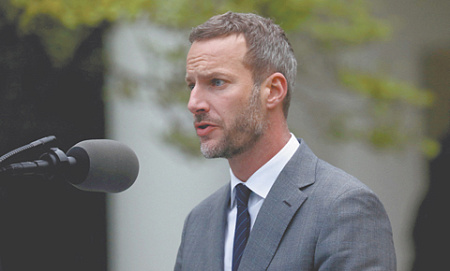
The administration of US President Donald Trump has resumed negotiations with Hamas. The group is trying to change its strategy and concentrate diplomatic resources on a dialogue with Washington on a comprehensive agreement on the Gaza Strip, under which it is ready to give up control, but would probably like to receive security guarantees. Previous attempts by the United States to negotiate with Hamas through autonomous channels were rebuffed by Israeli Prime Minister Benjamin Netanyahu, which led to the freezing of dialogue.
Sources of the Israeli channel i24 reported on the withdrawal of the United States and Hamas to direct negotiations. The fact of bilateral consultations is also confirmed by Arab publications. According to the Lebanese newspaper Al-Modon, the dialogue between American officials and Palestinian radicals is conducted confidentially, without the participation of Israelis.
The purpose of the contacts is to resolve complex political issues that follow hand in hand with the issue of the release of Israeli hostages captured during the tragedy on October 7, 2023. The statements made recently by Trump’s special envoy for hostage affairs, Adam Beler, about a possible cease-fire in Gaza if all the abductees are returned to Israel reflect the efforts of the United States and Hamas.
A dialogue that does not include Israel relies, among other things, on the help of intermediaries. For example, during a recent visit by Palestinian radicals to Turkey, they asked Ankara to use its trusting relationship with the American leadership, according to sources in the Saudi newspaper Al-Sharq al-Awsat. In addition, Hamas is looking for other ways to get the Trump administration to “play a more active role in putting pressure on Israel.” Qatar acts as a trustee in this process.
At the end of March, Stephen Witkoff, the American leader’s special representative for the Middle East, put forward a proposal to Hamas that, in his opinion, would help defuse the situation around the Gaza Strip and bring the parties to the ongoing armed conflict back to the negotiating table. As a gesture of goodwill, the militants were advised to release one of the living hostages, Edan Alexander, who holds dual American and Israeli citizenship. In return, Witkoff promised that President Trump would make an official appeal, primarily addressed to Israel, to stop fighting in Gaza for a while and put pressure on his government to revive the stalled negotiations.
Two months ago, it became known that the United States was trying to enter into a direct dialogue with Hamas. The consultations, which were supervised by Adam Beler, concerned not only Edan Alexander, but also other hostages, as well as issues of post-conflict settlement. However, these communication channels were frozen after Israeli officials learned that such a format existed, and apparently initiated a series of leaks to American and Israeli publications. The Jewish state has informed the United States through diplomatic channels of its dissatisfaction with the very idea that Israel, as one of the parties to the armed conflict, was left out of the negotiation process.
The Israel Defense Forces (IDF) is currently continuing preparations for an expanded land campaign in the Gaza Strip. Its command intends to stretch its “security zone” to the north, south and east. According to i24, the Netanyahu government is separately considering the option of issuing new arrest warrants for those Palestinian prisoners who were released in previous rounds of the exchange. According to the Israeli broadcasting Corporation Kan, the Netanyahu government refuses to stop its military operation in Gaza, which resumed on the night of March 18, without fulfilling two conditions by the Hamas group. They suggest the dissolution of the armed wing of the Palestinian group and its abandonment of administrative control over the Gaza Strip. The Trump administration was notified of these requirements directly. Another question is whether any security guarantees will be given to those Hamas leaders who lay down their arms. The rhetoric of the Israeli leaders indicated that the militants were facing liquidation only.
Some members of Israel’s ruling coalition openly say that the release of hostages held by Hamas during Black Saturday is not a priority for the authorities. “We must tell the truth: the return of the hostages is not the most important thing,” Bezalel Smotrich, Israeli Finance Minister and leader of the far–right Religious Zionism party, said the other day. “This is obviously a very important goal, but if you want to destroy Hamas so that there is no repeat of the events of October 7, then you must understand that there cannot be a situation in which Hamas remains in Gaza.”
